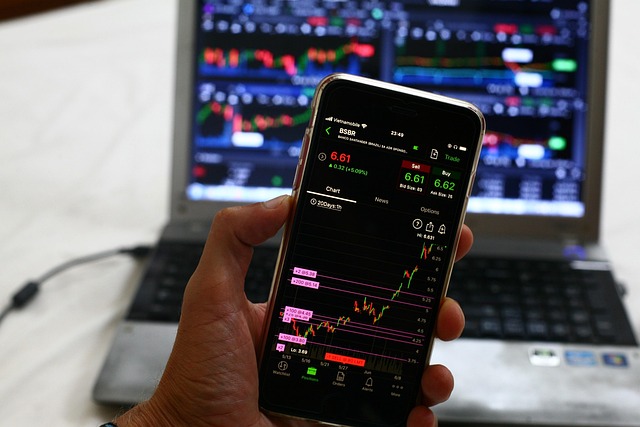What Is the Best App to Trade Stocks: A Practical, Data-Driven Guide
Author: Jameson Richman Expert
Published On: 2025-10-24
Prepared by Jameson Richman and our team of experts with over a decade of experience in cryptocurrency and digital asset analysis. Learn more about us.
When asking "what is the best app to trade stocks," there isn’t a single universal answer — the best app depends on your goals, experience, and the markets you trade. This article explains how to choose the best stock trading app for beginners, active traders, long-term investors, options traders, and international users. You’ll get feature-by-feature comparisons, actionable checklists, security and cost considerations, and recommended apps for different use cases so you can decide quickly and confidently.

Why the question matters: mobile-first trading and what to evaluate
Mobile and web trading apps have democratized access to financial markets. But features, costs, execution quality, educational tools, and security vary dramatically. When determining what is the best app to trade stocks for you, evaluate these core factors:
- Costs & fees: commissions, margin rates, inactivity fees, account fees.
- Order execution & routing: speed, price improvement, availability of order types (market, limit, stop, stop-limit, trailing stop, PO, OCO).
- Available instruments: U.S. stocks, fractional shares, options, ETFs, mutual funds, bonds, futures, crypto.
- Research & tools: analyst reports, screeners, charts, technical indicators, news feeds, fundamental data.
- Regulation & security: SIPC protection (or equivalent), encryption, two-factor (2FA), account insurance and disclosure.
- User experience: app performance, usability, educational materials, customer support.
- Advanced features: API access, direct market access (DMA), paper trading, algo tools, margins, options chains and Greeks.
Top stock trading apps in 2025 — summaries and who they’re best for
Below are widely used, highly-rated broker apps with a short summary and ideal user profile for each. These summaries focus on mobile/web apps and regulatory standing as of 2025.
1. Fidelity (Fidelity Mobile)
Best for long-term investors and retirement accounts: Fidelity is known for robust research, low-cost funds, excellent customer service, and a polished mobile app.
- Strengths: In-depth research, no-fee index funds, strong educational content, fractional shares, IRAs.
- Ideal for: Buy-and-hold investors, retirement savers, research-driven investors.
2. Charles Schwab (Schwab Mobile / Schwab.com)
Best for all-around investors who want research plus great customer service and custodial features. Schwab blends user-friendly apps with full-service brokerage capabilities.
- Strengths: Comprehensive research, commission-free US stock and ETF trades, strong client service, Schwab Intelligent Portfolios.
- Ideal for: Investors who want a full-service brokerage with modern mobile tools.
3. TD Ameritrade (thinkorswim Mobile)
Best for active traders and options traders: thinkorswim is a highly advanced trading platform now integrated under Schwab branding but remains a top choice for active analysis.
- Strengths: Professional-level charts, advanced options tools, paper trading, streaming news.
- Ideal for: Active traders, options traders, technical traders.
4. Interactive Brokers (IBKR Mobile)
Best for international traders, professionals, and very active users: Interactive Brokers provides low-cost execution, wide market access, advanced order types, and margin products.
- Strengths: Access to global markets, low margin rates for professionals, extensive order types, APIs.
- Ideal for: Professional traders, frequent traders, international investors, algorithmic traders.
5. Robinhood
Best for beginners focused on simplicity and zero-commission trades: Robinhood popularized commission-free trading and offers a minimalist mobile experience.
- Strengths: Simple UI, fractional shares, cryptocurrency access in-app.
- Limitations: Fewer research tools, controversies around payment for order flow — consider if deep research or institutional-level tools are required.
- Ideal for: New investors or those who prioritize ease-of-use and low friction.
6. Webull
Best for cost-conscious active traders who want advanced charts: Webull offers strong charting, indicators, zero-commission stock trades, and paper trading features.
- Strengths: Detailed technical analysis tools, extended-hours trading, desktop + mobile parity.
- Ideal for: Active traders who want advanced charts without a steep learning curve.
7. Vanguard
Best for index and long-term fund investors: Vanguard focuses on low-cost funds and straightforward investing experience for buy-and-hold strategies.
- Strengths: Investor-focused pricing, industry-leading low-cost funds and ETFs.
- Ideal for: Long-term investors prioritizing low expense ratios and passive strategies.
8. SoFi Invest
Best for beginner-friendly investing with extra financial products: SoFi combines easy investing with banking, student loan refinancing, and crypto access.
- Strengths: Simple UI, fractional shares, bundling of financial products and member benefits.
- Ideal for: Young investors or those preferring an integrated financial app.
Feature-by-feature comparison: How to decide objectively
To select the best app, score potential apps across these dimensions on a 1–5 scale and weight them by your priorities (e.g., cost 25%, research tools 20%, execution 20%, mobile UX 15%, security 20%). Below are practical details to evaluate.
Costs & Pricing
- Commission structures: Most major US brokers now offer $0 commissions on US-listed stocks and ETFs, but options contracts, mutual fund fees, and certain account services may still carry fees.
- Margin interest: Varies widely — professional traders should compare IBKR and Interactive Brokers' tiered margin rates for cost efficiency.
- Payment for order flow: Some brokers rely on PFOF; understand the trade-offs between zero commissions and potential routing practices.
Execution Quality
Execution quality isn’t just about speed — it’s price improvement and slippage. Look for third-party execution reports and broker-provided statistics. FINRA and the SEC require periodic disclosures; you can review broker execution quality on their public reports and FINRA pages (https://www.finra.org).
Research & Education
Active traders need real-time news, charting, and level II data; investors benefit from fundamentals, analyst ratings, and screeners. For regulatory and investor protection resources, see the U.S. SEC investor education site: Investor.gov.
Available Markets & Instruments
If you need futures, forex, or crypto in the same interface, some brokers integrate crypto trading or partner with crypto exchanges. If you plan to trade crypto alongside stocks, you may also consider specialized platforms. For example, popular crypto exchanges with mobile apps include Binance, MEXC, Bitget, and Bybit:
- Register at Binance (crypto access and derivatives)
- Create a MEXC account
- Sign up for Bitget
- Join Bybit
If you trade both stocks and crypto, consider keeping crypto and securities accounts separate for regulatory clarity and differing custody arrangements. For crypto-focused educational guides and market perspectives, these resources are useful background reads: best crypto guide for 2024, best coin price apps for 2025, and Bitcoin ETF analysis 2025.

Best apps by use case — concrete recommendations
Below are no-nonsense recommendations tailored to common investor profiles. Each recommendation includes the main advantages, limitations, and action steps.
Beginners (first-time investors)
Top picks: Robinhood, SoFi, Webull
- Why: Intuitive mobile UI, fractional shares, low minimums, educational content, easy funding.
- Limitations: Less deep research than full-service brokers; check trade confirmations and any fee disclosures.
- Action steps: Start with a small amount, use paper trading or demo (Webull offers paper trading), learn order types before using market orders.
Passive/long-term investors
Top picks: Fidelity, Vanguard, Charles Schwab
- Why: Low-cost index funds, strong retirement account support, trustworthy custodial practices.
- Limitations: Desktop platforms can be less flashy for active traders, but the mobile apps are reliable.
- Action steps: Open IRA or Roth IRA, set up automatic contributions, use built-in screeners to pick low-cost ETFs.
Active traders & options traders
Top picks: thinkorswim (TD Ameritrade), Interactive Brokers, Webull
- Why: Advanced charting, ladder interfaces, deep options chains with Greeks, advanced order types.
- Limitations: Steeper learning curves and occasionally higher fees for advanced services or data packages.
- Action steps: Paper trade on thinkorswim or IBKR’s demo account first, practice complex options strategies, monitor margin requirements closely.
International traders
Top pick: Interactive Brokers
- Why: Access to many global exchanges, multi-currency accounts, lower cross-border fees.
- Limitations: Interface complexity and compliance paperwork depending on jurisdiction.
- Action steps: Confirm local regulatory access and tax reporting, set multi-currency base if required.
Crypto-savvy traders who also trade stocks
Strategy: Use a reputable broker for securities and a dedicated crypto exchange for digital assets. Keeping accounts separate helps manage regulatory and custody differences.
- Suggested exchanges for crypto access (not securities): Binance (register), MEXC (register), Bitget (register), Bybit (register).
- Further crypto-reading: Understanding MEXC grid trading bots, XRP price considerations & research.
Evaluating security and regulatory protections
Security and regulatory protections are essential when determining what is the best app to trade stocks for your needs.
- SIPC protection: In the U.S., most brokers are SIPC-members. SIPC protects customers if a brokerage firm fails, up to certain limits. Learn more at SIPC’s site (https://www.sipc.org).
- FDIC coverage: Cash swept into partner banks may be FDIC-insured — check your broker’s disclosures.
- Two-factor authentication (2FA): Always enable 2FA; prefer hardware keys or authenticator apps over SMS where possible.
- Account monitoring & alerts: Use login alerts, withdrawal notifications, and unusual-activity monitoring.
- Regulatory oversight: Reputable brokers are registered with FINRA and the SEC in the U.S. Verify registration and disciplinary records via FINRA’s BrokerCheck: https://brokercheck.finra.org.
Common traps and how to avoid them
New and even experienced traders can fall into common traps. Avoid these mistakes:
- Using market orders without understanding spread/slippage: For low-liquidity stocks or earnings-time volatility, prefer limit orders.
- Over-leveraging on margin: Margin amplifies gains and losses; always calculate worst-case scenarios and ensure you can meet margin calls.
- Ignoring tax implications: Frequent trading triggers short-term capital gains tax in many jurisdictions. Keep precise records.
- Not checking order execution quality: Especially with commission-free brokers that rely on payment for order flow — monitor fills, price improvement reports, and execution times.
- Mixing custody for crypto & securities: Crypto custody is not SIPC-protected; keep crypto exposures separate and informed.

How to test an app before committing — practical steps
Try this checklist before transferring large funds or using margin:
- Open a demo or paper trading account (thinkorswim, Webull, and some brokers offer this).
- Execute a variety of order types: market, limit, stop-limit, and options trades if relevant.
- Measure the app’s latency and reliability during market open and high volatility events.
- Check funding and withdrawal processes and timings (ACH, wires, instant deposit limits).
- Review trade confirmations and account statements for clarity and timeliness.
Checklist: questions to ask when choosing your trading app
- Does the app support the instruments I need (stocks, options, ETFs, futures, crypto)?
- What are the true costs (commissions, margin, exchange/SEC fees, data fees)?
- How robust are the research tools and educational content?
- What protections are in place (SIPC/FDIC, 2FA, encryption)?
- Is the broker regulated in my jurisdiction and does it have good compliance history?
- Can I demo the platform before funding?
- Does the broker provide tax documents that match my reporting requirements?
Real-world examples: selecting the best app for several profiles
Example 1 — Emily, 28, beginner, wants to invest $200/month for retirement:
- Recommendation: Fidelity or Vanguard for IRA contributions due to low-cost index funds and easy recurring transfers. Fidelity’s app is particularly beginner-friendly with strong customer support.
- Action: Open a Roth IRA at Fidelity, set automatic monthly contributions, select low-cost target-date or index funds.
Example 2 — Raj, 40, trades options daily and needs advanced charts:
- Recommendation: thinkorswim (TD Ameritrade) or Interactive Brokers for advanced options analytics, real-time data, and reliability.
- Action: Paper trade multi-leg options strategies on thinkorswim, then scale into live account once comfortable.
Example 3 — Maria, 35, invests globally and wants exposure to international equities:
- Recommendation: Interactive Brokers for wide global market access and multi-currency accounts.
- Action: Open IBKR account, confirm markets available in your country, set base currency to avoid excessive conversion fees.

SEO and longevity: staying updated and adapting
Platforms evolve. New fee structures, acquisitions, or regulatory changes can alter which app is the best. Subscribe to broker newsletters, follow regulatory releases (SEC and FINRA), and periodically re-score your app against your priorities.
Useful authorities and guidance:
- FINRA (Financial Industry Regulatory Authority)
- SEC Investor Protection (Investor.gov)
- Stock trading overview — Wikipedia (good for historical context)
Further reading on crypto and related market tools
If you trade both equities and crypto or use hybrid strategies, the following in-depth resources offer context on crypto markets, price apps, trading bots, and ETFs:
- XRP price prediction & analysis
- Understanding MEXC grid trading bot in 2025
- Best crypto to buy today — guide for 2024
- Best coin price app for 2025
- Which Bitcoin ETF is better in 2025
FAQ — Quick answers about choosing a stock trading app
Is free always best?
No. Zero commissions are helpful, but evaluate execution quality, order routing, margin rates, and data fees. A slightly pricier broker may offer better execution, security, or research that offsets cost differences.
Can I use multiple apps?
Yes. Many traders use a primary broker for core accounts and secondary apps for specific strategies (e.g., options paper trading, crypto exchanges). Keep track of accounts for tax reporting.
Are mobile apps secure?
Most reputable brokers use bank-grade encryption and 2FA. Always enable security features and ensure your phone’s OS and apps are up-to-date. Use strong, unique passwords and consider a password manager.
What should beginners do first?
Start with a demo account or a small funded account, learn order types (limit vs market), set up recurring contributions, and use dollar-cost averaging for long-term goals.

Conclusion — how to choose what is the best app to trade stocks for you
There isn’t a single "best" app for everyone. The best app depends on your goals: beginners benefit from simple, low-cost apps; active traders require advanced order types and execution quality; long-term investors prioritize low-cost funds and custody stability. Use a weighted checklist to evaluate cost, tools, execution, and security. Test a platform with demo trading, confirm regulatory protections like SIPC and FINRA registration, and revisit your choice as your trading needs evolve.
For readers interested in crypto alongside equities, consider separating your crypto exchange accounts and securities brokerage accounts and review specialized resources and exchanges such as Binance, MEXC, Bitget, and Bybit. For deeper crypto trading and market analysis, see the linked in-depth guides above.
Use this guide as a decision framework: rank your priorities, test the top 2–3 platforms that match your needs, and choose the one that consistently performs in cost, execution, and security. That is how you’ll find the best app to trade stocks for your unique situation.